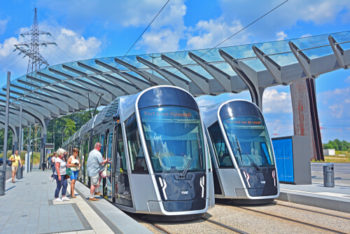

While the arguments around the Delhi Metro price hike, or the even pricier Mumbai metro continues to rally on, the small European nation of Luxembourg has beaten every other nation in the world to the draw and abolished fares for all means of public transport in the country starting 2019. The new coalition government has promised the abolishing of tickets on trains, trams, and buses from next summer. The landmark ruling last week was complemented by further announcements of an increase in minimum wage and legalization of marijuana by 2023. Luxembourg will beat Estonia another European country with a small population to the move. Other cities in Germany, and even Wales, which is experimenting with free travel on weekends are on their way.
So, how does a country nearly double the area of Delhi (India) and more notably the largest GDP per capita in the world offer free public transit? Relatively tiny population is obviously one reason.
Luxembourg, a nation of nearly 600,000 and bordered by Belgium, France, and Germany hasn’t shocked anyone with its decision to make public transit in the country free, in fact, it has been gradually moving towards this for some time. A two-hour ticket, enough to cover the longest direct train route across the country (from southern Differdange to northern Troisvierges), on the railways costs €2 (or €3 in first class), while an all-day pass costs €4. Besides this, young people and students already travel for free.
The operating cost for the system comes in at just under €1 billion, while the revenue generated from fares is around €30 million. A more practical outlook shows that the return from fares covers 3 percent of the operational cost. So, in abolishing the fares altogether the government has simply formalised the status quo. Dispensing with the need for tickets also cuts the costs incurred selling and checking them, and with a well thought out strategy, to partly recoup the revenue shortfall by canceling the commuter subsidy.
In Delhi, the expansive metro network, owned by the central and state government, reported losses of around ₹350 crore in its last annual report with operational costs (including asset depreciation) and total revenue running at roughly around ₹5300 crores, not bad for a public transport system. However, the overall outstanding cost of the DMRC currently lies at ₹70,000 crore, with the newly constructed Phase-III now operational. A cost that must be borne by the state and central government, using tax funds.
[related_post]
Now, the public network that supports 29 lakh commuters daily, unlike other public services like water sanitation and garbage disposal is a system that the government has consciously decided should be self-sustaining, and thus, levies a calculated rate. Going a step beyond its system with the bus network which it tries to support with subsidies while keeping rates fixed and low (lowest of the 5 metropolitans). The bus network has suffered since inception and continues to bleed money (as of 2016, ₹3 crore a day) thanks to the mismanagement of funds and resources. While on the other hand, the Delhi Metro, by and large, is the most effectively managed public transport system in the state.
Read More: Finally, Delhi makes a move to electric buses
In Delhi, keeping metro fares too low risks stretching an extended system beyond its limits. A far better option seems to be to improve the bus network massively, and then consider pushing for higher use by select exemptions. On high pollution days for instance, students could be given exemptions from paying.
Andhra Pradesh is striving towards greening its energy sector with quite some speed. In a…
With an objective to bolster India’s green energy goals, a Tripartite Agreement has been signed…
The Union MNRE Minister Pralhad Joshi launched the Green Hydrogen Certification Scheme of India (GHCI)…
India’s energy conglomerate Bharat Petroleum Corporation Limited (BPCL) has commissioned a 5MW green hydrogen plant…
In a historical development, the European Space Agency (ESA) has successfully launched its pioneering ‘Biomass’…
As India looks to bolster its biofuel sector in the era of sustainable development, the…